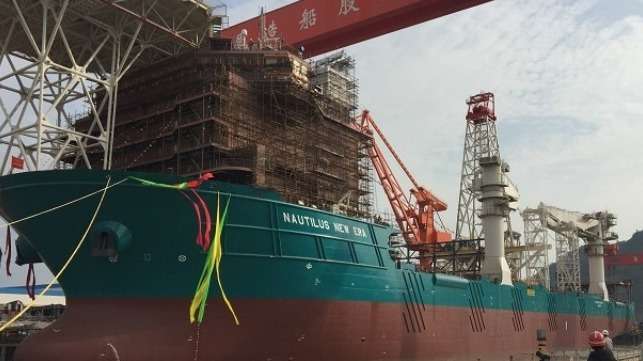

Last month in China, the Mawei Shipyards launched the Deep Sea Nautilus, the world’s first ship designed for mining deepwater seabeds.
The Deep Sea Nautilus is a 745-foot-long megaship capable of carrying 39,000 tons of ore—plus a 200-person crew and deep-sea mining robots. Nautilus Minerals, which owns the ship, plans to start gold and copper mining in the Solwara I, a mile-deep site in the coastal waters of Papua New Guinea.

Nautilus Minerals is a Canadian company with an ambitious deep-sea mining plan, centered around high-tech underwater robots that wouldn’t look totally out of place in Star Wars. This February the company successfully tested its line-up of three robots at depths of 1,500 meters, or about 0.93 miles, or about 4900 feet.
Two robots are purpose-built for preparing and pulverizing the metal rich seabed; a third robot will mix the pulverized ore into a slurry, to be pumped up to the Deep Sea Nautilus for further processing.

Tongling Nonferrous Metals Group, a Chinese copper company, will be the first buyer of Nautilus Minerals’ ore. This kind of purchase further indicates ambitions for large-scale deep-sea operations by Chinese firms. Chinese mining companies already hold three mining licenses in the Pacific Ocean from the International Seabed Authority, while railroad equipment maker China Railroad Corporation purchased Soil Mechanics Dynamic, a leading manufacturer of underwater mining and construction equipment.

China’s deep-sea mining would enable the nation to maintain sovereign control over strategic resources like copper andrare earth minerals. Activities in international waters would also extend Chinese commercial presence in the global commons as well as further solidify Chinese claims to waters in the East and South China Seas. And, of course, the vast amount of oceangraphic data gathered by deep sea mining could prove useful to military operations like submarine and anti-submarine warfare.
You may also be interested in:
- China is building the world’s largest facility for robot ship research
- The Great Underwater Wall of Robots: Chinese Exhibit Shows off Sea Drones
Peter Warren Singer is a strategist and senior fellow at the New America Foundation. He has been named by Defense News as one of the 100 most influential people in defense issues. He was also dubbed an official “Mad Scientist” for the U.S. Army’s Training and Doctrine Command. Jeffrey is a national security professional in the greater D.C. area.
